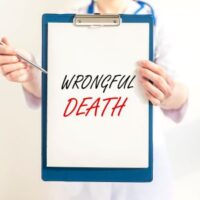Who Has Authority to File a Wrongful Death Case in Maryland?

It is always devastating to lose a loved one unexpectedly, but the circumstances are even more tragic when the victim was killed in an accident that was someone else’s fault. Motor vehicle crashes, slip and falls, medical malpractice, and many other accidents happen because of negligence. You might be aware that victims have rights when injured in these types of incidents, but survivors also have remedies under Maryland’s wrongful death statute. It is possible to recover compensation for the losses you suffer if someone close to you was killed.
However, the statute includes strict rules on who is allowed to seek damages in a wrongful death lawsuit. You must have standing, a legal concept that means you have the authority to act in a court-related proceeding. Without it, your case will be dismissed. Plus, there are additional facts you need to prove beyond standing. Because of these complications, it is wise to retain an Owings Mills wrongful death attorney for help with your case. Some information on standing is also important.
Proving a Wrongful Death Case: A wrongful death claim is a type of personal injury case, so the same principles of negligence apply. You must prove:
- The at-fault party had a duty to act with reasonable care.
- That person or entity breached the duty of care through unsafe misconduct.
- The breach caused an accident that killed your loved one.
- You suffer losses because of the void left behind by the death of someone close to you.
These are the essential elements of any accident case. However, in a wrongful death case, there is the additional factor of standing.
Standing in Wrongful Death Claims: Not surprisingly, the people who have the power to sue for wrongful death in Maryland are the ones closest to the deceased victim. They include:
- The surviving spouse;
- Adult children;
- Minor children, when a guardian has been appointed to act on their behalf; and,
- The decedent’s parents.
If none of these individuals exist, you may have standing if you are a relative of the decedent and you were financially dependent on the decedent for support.
Compensation for Survivors: Standing is a separate issue from monetary damages, which can be confusing. Having standing does not mean you are entitled to the full amount of compensation. When there are other surviving family members, they are also beneficiaries. Any monetary damages are apportioned and distributed to survivors according to percentages.
Beneficiaries may be entitled to the following in a wrongful death case:
- Reimbursement for the costs of medical care, funeral, and burial;
- Amounts for lost wages and future earning capacity;
- Losses related to love, guidance, education, emotional support, and other contributions the decedent can no longer provide.
Our Maryland Wrongful Death Lawyers Will Assist with Your Case
This explanation about standing is helpful, but wrongful death laws in Maryland are complex. To avoid mistakes, please contact Furman | Honick Law to learn how we can help with your claim. You can call 410-844-6000 or go online to set up a free consultation at our offices in Owings Mills or Baltimore.
Source:
mgaleg.maryland.gov/mgawebsite/laws/StatuteText?article=gcj§ion=3-902&enactments=True&archived=False